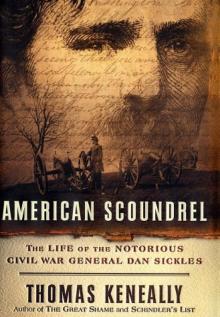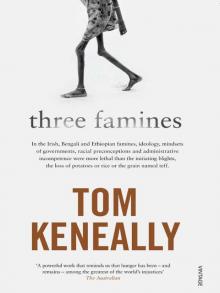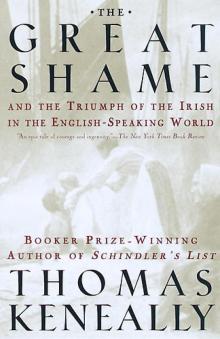- Home
- Keneally, Thomas
Three Cheers For The Paraclete
Three Cheers For The Paraclete Read online
Thomas Keneally is the multi-award-winning author of twenty-seven works of fiction and ten works of non-fiction. In 1982 he won the Booker Prize for Schindler’s Ark, which Steven Spielberg then made into the Academy Award-winning film Schindler’s List. His novels The Chant of Jimmie Blacksmith, Gossip from the Forest and Confederates were shortlisted for the Booker Prize, while Bring Larks and Heroes and Three Cheers for the Paraclete each won the Miles Franklin Award.
Tom is married with two daughters and four grandchildren.
BY THE SAME AUTHOR
FICTION
The Place at Whitton
The Fear
Bring Larks and Heroes
The Survivor
A Dutiful Daughter
The Chant of Jimmie
Blacksmith
Blood Red, Sister Rose
Gossip from the Forest
Season in Purgatory
A Victim of the Aurora
Passenger
Confederates
The Cut-rate Kingdom
Schindler’s Ark
A Family Madness
The Playmaker
Towards Asmara
By the Line
Flying Hero Class
Woman of the Inner Sea
Jacko
A River Town
Bettany’s Book
An Angel in Australia
The Tyrant’s Novel
The Widow and her Hero
NON-FICTION
Outback
The Place Where Souls are Born
Now and in Time to Be
Memoirs from a Young
Republic
Homebush Boy
The Great Shame
American Scoundrel
Lincoln
A Commonwealth of Thieves
Searching for Schindler
All rights reserved. No part of this book may be reproduced or transmitted by any person or entity, including internet search engines or retailers, in any form or by any means, electronic or mechanical, including printing, photocopying (except under the statutory exceptions provisions of the Australian Copyright Act 1968), recording, scanning or by any information storage and retrieval system without the prior written permission of Random House Australia. Any unauthorised distribution or use of this text may be a direct infringement of the author’s and publisher’s rights and those responsible may be liable in law accordingly.
Three Cheers for the Paraclete
ePub ISBN 9781742743387
Kindle ISBN 9781742743394
A Vintage book
Published by Random House Australia Pty Ltd
Level 3, 100 Pacific Highway, North Sydney, NSW 2060
www.randomhouse.com.au
First published by Angus & Robertson Ltd in 1968
First published by Vintage in 2008
Copyright © Thomas Keneally 1968
The moral right of the author has been asserted.
All rights reserved. No part of this book may be reproduced or transmitted by any person or entity, including internet search engines or retailers, in any form or by any means, electronic or mechanical, including photocopying (except under the statutory exceptions provisions of the Australian Copyright Act 1968), recording, scanning or by any information storage and retrieval system without the prior written permission of Random House Australia.
Addresses for companies within the Random House Group can be found at www.randomhouse.com.au/offices.
National Library of Australia
Cataloguing-in-Publication Entry
Keneally, Thomas, 1935–.
Three cheers for the paraclete.
ISBN: 978 1 74166 760 8 (pbk).
A823.3
Acknowledgement (pages 134 and 138): By Ezra Pound, from The Cantos of Ezra Pound, copyright © 1934, 1937, 1940, 1948, 1956, 1959, 1962, 1963, 1966, and 1968 by Ezra Pound. Reprinted by permission of New Directions Publishing Corp.
Cover photograph by Getty Images
Cover image selection and design by Jenny Grigg
CONTENTS
Cover
About the Author
By the same Author
Title Page
Copyright
Imprint Page
Dedication
Chapter 1
Chapter 2
Chapter 3
Chapter 4
Chapter 5
Chapter 6
Chapter 7
Chapter 8
Chapter 9
Chapter 10
Chapter 11
Chapter 12
Chapter 13
Chapter 14
Chapter 15
Chapter 16
Chapter 17
Chapter 18
Chapter 19
Chapter 20
Chapter 21
To Derek and Alison Whitelock
1
ONE SATURDAY EVENING, Maitland had to say Mass on a headland for a guild of graduates. The occasion had been arranged in the heat of early March, but on the afternoon itself dusk was all cold light and fierce winds. The altar cloths had to be tacked down, a truck to be driven to the weather side of the altar lest the chalice and chalice veils blow away. The Mass proceeded under a sky dark as plums. The sea raced in obliquely, breaking on his left, and wraiths of spray infested the hill. He enjoyed the occasion and was happy when turning to speak to these people who half-lay to hear him. They reclined on rugs and ground-sheets as if they might well be preparing to drink coffee from a thermos or make love. This somehow gave him the sense that what he performed had an affinity to the earth and the elements and the blood. So that, for the first time since coming home at Christmas, he did not feel an alien.
In view of the elemental air of the place, he changed his mind on what to say to them. He began by telling them that he had been prepared for a picnic ground with silver garbage tins. He said that what he had expected were those pixie-hatted picnic huts which record that Bill loved Olive at some stage and that Olive’s small brother had learnt there his first four-letter word.
Laughter moved among the young men and women, reclining hip and shoulder on the earth among grazing Lambrettas and cars nicely blurred to soft animal shapes by twilight.
He began again.
‘Christianity gave Eros poison to drink, says some German or other. Eros is the name of love between the sexes. Is the German right? Yes, he is.’
The trouble was that he sounded like a fashionable priest, the glib kind. Perhaps his hearers had never felt, as he did, that they and he had been separated from their origins in the earth, and that the hill, the sea, the dark and the wind encouraged a tracing of the tragedy. He traced it badly, with a hateful facility.
‘There are historical causes why European Christianity gave Eros poison to drink, took a confused view of him, placed him under a subtle ban.’
He said what the causes were, he touched lightly on centuries and found them pliant to his touch. It was false pliancy.
‘Of course,’ he said urgently, ‘anything I say does no more than give hints of the way the truth was lost. We know only that the truth was lost, that Eros was poisoned.’
It was warm in chasuble and alb and the rest, but he was cold to the calves in his thin, wet shoes.
‘What have you been told from childhood, again and again? You’ve been told that Eros is a source of danger. So he is. Yet it must have seemed that if he did not have a hand in the propagation of little Catholics, he wouldn’t be given standing room. For Eros is a filthy little pagan with dirty habits. One comes to see that he has been maligned. His presence generates in a person those decent human enthusiasms without which life and even religion are lost. You complain of t
he pallid cast of soul of this or that priest? But he lacks the self-surrender imposed by Eros to help men to enthusiasm. The priest’s way is harder because he does not have this ready means of keeping his personality malleable. As you pity all sapless humans, you must pity and have understanding for the sapless priest. For some of us have been betrayed into a frame of mind that is justly expressed in the saying: “Because they love no one, they imagine that they love God.”’
After the Mass, a fire was built in one of the groins of the hill. It was made of a dead acacia-tree pulled whole out of the ground by men and priest. A fireplace was built of rocks, a wide, crafty oven worthy of the context, of men sacrificing, foraging, feasting in a gale. A first waft of wood-smoke stung the young women waiting with plates of meat in their hands. They began to talk together as if some doubt had been soothed. Flame rose and made the last light irrelevant. Finding another dead tree, men were content only with uprooting it. Meat fried on a griddle, blood fell into the fire, flame entered the eyes of the women, the slim and inviolate ones, the ones taut with child beneath their plaid coats.
It was like a rite.
The priest heard a voice at his elbow say, ‘Dr Maitland? Dr James Maitland?’ He turned to the voice with a wad of red meat in his hand. There was a young man with a piqued, satiric nose and a forty-inch waist. Beside him stood a soft, shy girl whose scarfed head looked Slavic in the firelight. She seemed irradicably old-world and knew her place before a priest. As well, she was appallingly lovely.
‘Dr Maitland,’ the young man said, ‘I’m your cousin Brendan. This is my wife Grete.’
‘Brendan. Brendan Carroll?’
‘Of course.’
They both laughed at once and shook hands emphatically. The girl waited without reproach for them to cease exulting as kinsmen-strangers always, on meeting, insist on exulting.
‘This is a pleasure,’ said Maitland. He had heard of these two. Aunts and uncles who had known depression and wars, yet had won through to an Axminstered haven close to shops and bus, found lovely Grete and flabby Brendan a scandal.
‘You know,’ aunts told Maitland, who had been in Belgium for three years and needed to be freshly enlightened on The Family – Its Heroes and Apostates, ‘they both got honours at the university. He was offered a job with the State Planning Commission. She could have got a job on the university staff. But do you know what they said? They said they needed time to digest whatever it was they’d learnt. Whatever it was! After four years’ study and all those sacrifices by Madge and Charlie, he still didn’t know whether he’d learnt anything. Anyhow, they went off travelling like the people in the Depression. They worked as housekeeper and handyman in country pubs. Once they worked in a cannery and a bauxite mine. As far as I’m concerned, they deserve a taste of the Depression.’
‘Perhaps they’re just rounding out their education,’ Maitland vainly suggested; and angry avuncular feet shifted on the hard-won carpet.
‘For what it’s worth. You know he’s supposed to have published a book of poetry. I mean, you’d think if he had it would sell, wouldn’t it? There hasn’t been any poetry since Lawson and Wordsworth and all those. Poetry’s a novelty these days. So I keep on asking for it down at the newsagent’s. But they’ve never heard of it.’
Someone else said, ‘Charlie told me it sold five hundred copies. They live like tramps and all that comes out of it is a little book of poetry. And bad teeth.’
Someone else again: ‘What would have happened if she’d fallen pregnant is what I always wondered.’
Here were the two ramblers now, in the firelight. Their teeth were perfect and they showed no sign of parenthood.
‘I’ve been told so much …’ Maitland said. ‘The family is particularly proud of your book of verse, Brendan.’
The large young man closed his eyes and savoured honestly his literary kudos.
‘It sold five hundred copies,’ he explained. ‘That makes it a verse best-seller for this country.’
The girl said, ‘Anyhow, fodder, most pipple read verse by borrowing from libraries. All dose who should know say he’s der major poet of anodder tventy years.’
‘I thought you were both on the road,’ Maitland told them.
‘We’ve settled down,’ Brendan announced. Both he and Grete found the idea funny. ‘We settled down when the North-west mail brought us in this morning. We’ve been respectable for the last thirteen hours.’ The two of them laughed. ‘I’ll get a job with superannuation and Grete is starting Monday week in the German department of our old degree-shop. Grete’s really first-class on German literature. She ought to be. She’s a bloddy reffo.’ He glared at Grete. ‘Bloddy reffo!’ he snarled, and she giggled. ‘I wish I could bear the children. I’ve got the right hips. And you can write verse in a labour ward if put to it. But you can’t teach German.’
Grete and Brendan had been brought to the Mass by a friend who had done his duty by his degree and had a sedan as evidence of it. When tea had been drunk and the fire winked out, the same man packed the priest and Grete and Brendan into the back seat of the car and carried them back to the city in the sweet reek of new upholstery. Grete slept. Though they were wanderers, her soft dozing body seemed to suggest that all their arrivals were homecomings.
‘Where are you staying tonight?’ Maitland asked.
‘We know a fellow who owns a flat.’
Brendan’s friend looked sideways at his own wife in the front seat and said, ‘If it wasn’t that Helen’s parents were staying with us …’
In the city, when the poet sat forward, Grete’s head fell against the seat, the chin lepered by the blue light of car showrooms. Still she slept. It was this docile exhaustion and her refugee air that helped bring Maitland to a decision later in the evening.
Under Brendan’s sporadic directions, the car left the lolly-water ambiance of the big streets and found its way among terraces. They saw little corner pubs, strewing light at intersections, reach closing time and spill their fixed clientele out of doors. Brendan stared. Perhaps the aunts were right about him, since he obviously had that poet’s derangement that kindles to the grotesque and lets the familiar – Grete – go hang.
‘That’s the place,’ he called. At that, his wife roused herself and swallowed and looked instantly capable of greeting a new host, making a new home.
The place was a terrace with all its lights on. Three men were lowering a made-up bed by ropes from the top balcony to three others on the pavement. Two girls with that streaky hair and those narrow cheeks derived from too much claret-bibbing and Camus, watched from the rim of the pavement. It occurred to everyone in the car that the bed was being moved as some ultimate domestic expedient, that the house must already be full.
‘Grahame!’ Brendan hooted at one of the downstairs men.
Grahame came, yelling ‘Whoa!’ to those upstairs. The sight of what he called Brendan’s poxy old face caused him terrible joy and terrible contrition. ‘Christ,’ said Grahame, ‘any other night, old son, I really mean that. But it’s this party. I’ve got dozens of people staying, even married ones. Respectable as all get-out …’
Grahame stood back laden with the functional dolour of a hotel receptionist. Behind him the bed nosed the stonework like a small craft washed high by flood.
The car went forward then in a dubious gear to an area of bond stores. There was another place, Brendan said, but it would probably be better if he and Grete were let out at a corner. People didn’t have as much pity for you if you arrived in a car.
Grete sat still and blinked with an awesome placidity at everything he said.
‘Here,’ Brendan commanded sweetly after a time. ‘This is the corner.’
They got out. There was no sign of disquiet about them as they made their very pleasant good-byes.
‘Are you sure you’re going to get in?’ Maitland asked them.
Brendan said they were. Even if the tenant was out, he knew where the key was kept. He began to wave them on t
heir way. It was clear that if the car stayed to see them safely off the street he would take it as an intrusion.
What happened was that they spent the night in Maitland’s room at the House of Studies where he taught, while Maitland spent it in a bed in the infirmary, thirty yards down the same corridor.
Maitland had left the car after a short way, and found them chatting equably in the doorway of a warehouse. Here they might have meant to wait out that passing phenomenon called night, an arm around each other. When Maitland arrived, Brendan was actually shaking open an anthology held in his left hand. He could not have read it in that dark; perhaps the grain of the pages brought back whole cantos to him; perhaps he was searching for an address.
He was angry at being caught underneath the arches on a night in an age of plenty. But his cousin was a priest, and anger against a priest had shades of sacrilege. The facts were that they had a dollar between them, he and Grete, their luggage was at the railway, their money in a country bank, their parents in another city. Since Dr Maitland had taken the trouble to come hunting for them, he might as well know these things.
‘Come on,’ said Maitland. ‘My room’s just slightly more comfortable than a warehouse door.’
While in Belgium he had lived haphazardly in a two-room flat in Louvain, had been free to entertain vagrants if he wished. Now, as they walked a mile hunting a taxi, he had leisure to remember that he was not in fact giving Brendan and Grete the hospitality of a two-room flat but of a house for the training of priests where his own writ did not necessarily run. He had leisure, too, to feel a meddler, to assure and reassure Grete that she would not be driven out with incense and aspergillum, and to telephone the president of the house without having his call answered.

 Jacko
Jacko Flying Hero Class
Flying Hero Class The Chant Of Jimmie Blacksmith
The Chant Of Jimmie Blacksmith Three Cheers For The Paraclete
Three Cheers For The Paraclete The Widow & Her Hero
The Widow & Her Hero American Scoundrel
American Scoundrel The People's Train
The People's Train A Family Madness
A Family Madness The Daughters of Mars: A Novel
The Daughters of Mars: A Novel Homebush Boy
Homebush Boy Bettany's Book
Bettany's Book Three Famines
Three Famines The Great Shame
The Great Shame